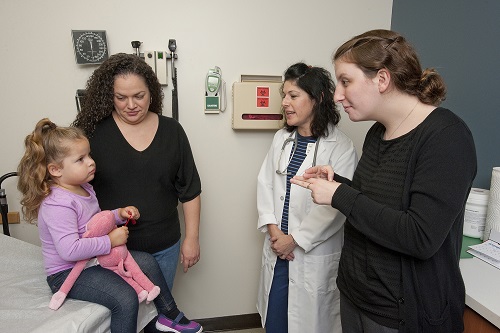Program to provide in-depth specialized education in health-care interpretation currently unavailable to interpreters.
Rochester Institute of Technology’s National Technical Institute for the Deaf has received approval from New York State Department of Education to establish a first-of-its-kind Master of Science degree program in health care interpretation to meet the demands of nationally certified sign-language interpreters desiring a master’s degree specific to working in healthcare environments.
The program is a collaborative venture between NTID and RIT’s College of Health Sciences and Technology and marks the first time that NTID will be partnering with another RIT college to provide a master’s degree program.

RIT’s National Technical Institute for the Deaf will establish a first-of-its-kind master’s degree program for sign-language interpreters desiring a degree specific to working in health-care environments.
“We are excited about this new venture with NTID in a graduate level degree for health care interpreters,” said Richard Doolittle, vice dean for RIT’s College of Health Sciences and Technology. “Our collaboration will help ensure these highly-skilled interpreters receive the kind of medical technical training they will need to succeed in healthcare settings.”
The program will meet the growing demand for specialized sign-language healthcare interpreters as more deaf and hard-of-hearing people enter the medical/healthcare fields, increase the number of specialized sign-language interpreters working in patient healthcare settings, and prepare interpreters to work in administrative roles to ensure language access to patients in hospital settings.
According to projections from the U.S. Bureau of Labor Statistics, between 2012 and 2022, there will be a 46 percent employment growth for interpreters and translators, much faster than the average for all occupations. The field is on track to add more than 29,000 new positions during that time period. Graduates of the program may find work as staff interpreters, freelance interpreters, or on a per-diem basis in health care, healthcare education and healthcare research settings nationwide.
“The program will provide in-depth specialized education in the field of healthcare interpretation that is not currently available to interpreters,” said Kim Kurz, chairperson of NTID’s American Sign Language and Interpreting Education Department, which will house the new degree program. “The program will appeal to certified interpreters aspiring to direct their careers into healthcare environments, as well as to interpreters who currently are working in the healthcare field.”
Applicants must have certification from the National Registry of Interpreters for the Deaf and hold a bachelor’s degree from a regionally accredited college or university for admission. The program begins with a one-week on-campus residency professional seminar, with the remainder of the program delivered online. Unique curricular features that incorporate rigorous academic and career preparation included in this primarily online degree include production of ASL/English skill development videos recorded and evaluated by peers and faculty, webinar-delivered case conferencing sessions led initially by faculty and progressing to student-led sessions; papers, exams and a final capstone project.
“The advanced skill sets required to interpret in health care, healthcare education and healthcare research environments constitute an emerging specialization in the interpreting profession,” said Gerry Buckley, president of NTID and vice president and dean for RIT. “There are currently no programs in the United States that offer a master’s degree in healthcare interpretation, and we are proud to be the first to provide this type of educational experience to meet the growing demand.”
For more information, go to https://www.ntid.rit.edu/aslie/mshci/overview.
About Rochester Institute of Technology
Rochester Institute of Technology is home to leading creators, entrepreneurs, innovators and researchers. Founded in 1829, RIT enrolls 18,600 students in more than 200 career-oriented and professional programs, making it among the largest private universities in the U.S.
The university is internationally recognized and ranked for academic leadership in business, computing, engineering, imaging science, liberal arts, sustainability, and fine and applied arts. RIT also offers unparalleled support services for deaf and hard-of-hearing students. The cooperative education program is one of the oldest and largest in the nation. Global partnerships include campuses in Croatia, Dubai and Kosovo.

